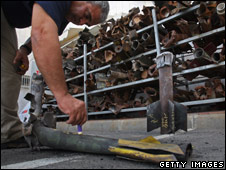|
|
By Tim Franks
BBC News, Sderot
|


Sderot has come under almost daily attack from Palestinian rockets
|
In its fight against Palestinian militants, Israel does not just use firepower. It also relies very heavily on intelligence - often provided by Palestinian collaborators or informants.
The question is - what should happen to them once it becomes too dangerous to stay on home turf?
In the last few years, a growing number of collaborators from Gaza have ended up in the Israeli town of Sderot, the place that, more than any inside Israel, has come under missile fire from Palestinian militants in Gaza.
It is one reason, the collaborators say, that life is not easy.
Revenge attacks
Siad has the trappings of success. He owns a pristine white BMW.
 |
 These people helped the Israeli security forces to rid us of Hamas and other enemies of Israel. Without their help the quality of Israeli intelligence would not be as good
These people helped the Israeli security forces to rid us of Hamas and other enemies of Israel. Without their help the quality of Israeli intelligence would not be as good

|
His house has separate, well-furnished bedrooms for his two young children. In the living room, a pair of fake tigers growl beneath the large television set.
They are the fruits of a scrap metal and construction business Siad has built in the 10 years since he left Gaza. For nearly 20 years before that, Siad worked for the Israelis.
"I provided information to Israel between 1977 and 1996," Siad explained, over Coke and coffee, in his plush living room.
"That's why I came here, that's why I became naturalised. That's why they (the Israeli authorities) gave me an ID card."
Siad says he saved Israeli lives with the information he passed on to the security forces.
He says he only left Gaza, 10 years ago, when it became too dangerous for him to stay. But he had to leave most of his family behind.
Since then, one of his sons has been shot and another imprisoned, in revenge.
The Israeli authorities will not let him take the rest of his family out of Gaza, and that has left him bitter.
"When I used to ask for one single cigarette the Israelis used to give me 20 - a whole pack," he recalls.
"Things have changed. The way I look at it, they only now like to take and not to give. They act like pigs."
Rough deal
Siad says he gets on well with his immediate Israeli neighbours. But not everyone in Sderot is pleased with the presence of former collaborators.
Batya Katar works in a car repair workshop, on the edge of town.
She is also the director of the Parents' Committee for Security in Sderot.
And she insists that as Palestinians have been housed in Sderot, so the number and the accuracy of the missiles fired from Gaza have increased. Batya claims that the collaborators are happy about it.
"I see it with my neighbours," she told me.
"All the time that the Qassam (rockets) are shot (by Palestinian militants), he dances. Why? If he wants to live here, and he wants to help Israel, why does he dance all the time?"
Quite the reverse, says Natan Shrayber, a lawyer for 80 Palestinians and their families living in Sderot.
According to Mr Shrayber, at least one of his clients, who still has family in Gaza, says the Israeli army should raze those areas from where the rockets are fired.
More broadly, the collaborators "are entitled to everything that the average Israeli has," he says.
"These people helped the Israeli security forces to rid us of Hamas and other enemies of Israel. Without their help the quality of Israeli intelligence would not be as good. If anything I think they deserve more than the average Israeli."
Natan Shrayber has taken his argument to the Israeli Supreme Court, in an effort to improve the deal the collaborators receive.
In the meantime, in his anonymous house off a main street in Sderot, Siad says he just wants to keep his head down and lead a normal, complete, family existence.
It is a contorted life, in Israel's edgiest city.
|








Bookmark with:
What are these?